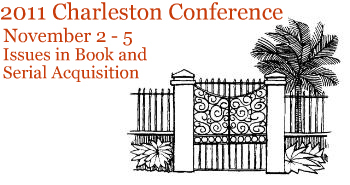This year at the Charleston Conference—the annual meeting of academic acquisitions librarians and library vendors held in Charleston, SC, from November 2 to 5—many of the plenary presentations shared a common theme: as libraries face new challenges, new ideas are needed. And as the main speakers and presenters touched on a wide range of issues, it became clear that there was no shortage of new ideas, and opinions, in the library world.
Ambitious projects
Although many academic libraries have been facing budget cuts—a fact echoed in the conference’s theme, “Something’s Gotta Give!”—many plenary session speakers at the conference were unafraid of thinking big. Indeed, several touched on collaborative projects which were grand and ambitious in scope.
For example, Michael Keller, university librarian at Stanford University Libraries, spoke about the importance of developing linked data and the Semantic Web to aid discovery of rapidly expanding academic resources. Keller recently helped compile a report, published last month, on a workshop held this summer by Stanford and the Council of Library and Information Resources (CLIR) to explore the challenges of creating a multinational and multi-institutional linked-data environment. (Linked data projects in the library world have been growing rapidly, as LJ has reported.)
The Digital Public Library of America (DPLA) was discussed briefly during a morning panel. Robert Darnton, director of the Harvard Library, presented the project, which aims to create a large-scale, freely accessible digital library, as a “feasible” and “affordable” project, built on the Jeffersonian ideal of knowledge as a public good. But he also acknowledged that there was a massive amount of work still to be done before the DPLA’s projected launch date in April 2013. (A major plenary session on the DPLA was held in Washington, DC, on October 21.)
Other potentially large-scale projects were also addressed during plenary sessions: MacKenzie Smith, research director at the Massachusetts Institute of Technology Libraries, spoke of the challenges surrounding the publication of electronic “data papers,” peer-reviewed research data sets, which could allow such data to be more easily shared. Mark Dimunation, chief of the Rare Book and Special Collections division at the Library of Congress, urged that a higher priority be placed on increasing accessibility of “hidden collections”—the vast amounts of unprocessed and uncataloged scholarly materials often overlooked in academic libraries.
Ebook issues
Other speakers took a more wide-angle view on issues facing libraries. ITHAKA president Kevin Guthrie and university librarian Anne Kenney of Cornell University Library, for example, both acknowledged ebooks as “game changers” for libraries, with Kenney specifically spotlighting the development of the HathiTrust digital repository, of which Cornell has been a partner since last year.
If ebooks are a “game changer,” however, part of that game is being played out in the courtroom. Case in point: HathiTrust, along with Cornell and four other universities, was sued in September by the Authors Guild and others for copyright infringement, and the long-running Google Books case, following Judge Denny Chin’s rejection of a settlement in March, still awaits resolution.
Little wonder, then, that a panel entitled “The Long Arm of the Law” would make an encore appearance at the conference, having debuted last year. Jack Bernard, the University of Michigan’s associate general counsel, wryly noted that “something’s gotta give” when there’s a panel of lawyers at a library conference. He then sketched out recent legal developments in the copyright world, including Wiley v. Kirtsaeng, which could affect the ability of libraries to lend foreign-made works.
During the same session, attorney William Hannay of legal firm Schiff Hardin stressed that the outcome of the Google case would have a profound effect on competition in the digital library market. He supported a highly competitive one: “Let a thousand points of digitizing shine,” he said.
“What will give?”
On the last day of the conference, in a speech provocatively titled, “The Status Quo Has Got To Go,” Brad Eden, dean of library services and professor of library science at Valparaiso University, IN, was blunt in summing up the state of academic librarians: “We do not challenge ourselves,” he said.
He urged his audience to stay informed about innovative technologies, specifically name-checking open-source projects such as the Blacklight discovery interface and the Koha integrated library system. He also said that librarians need to be aware of important studies in their field—specifically noting a recent OCLC/OhioLink study which challenged the “80/20” rule, a commonly held belief that 80 percent of library circulation is driven by 20 percent of the collection; the study suggested that the ratio was actually closer to 80/6.
At the final plenary session of the conference on Saturday afternoon, Kimberly Douglas, university librarian at the California Institute of Technology, and Melody Burton, chief librarian at the University of British Columbia, spoke to a relatively small crowd of diehard conference-goers, focusing mainly on the rising cost of serials.
Jumping off from the conference’s theme of “Something’s Gotta Give!,” Burton asked, “What will give?…Will it be budgets? Will it be jobs? Will it be traditional models of service?” Burton said that many librarians are “quite committed to transformational change,” but they “doubt that they will see it in [their] lifetime.” The “real change” she is waiting for, she said, “is a change to the publishing model.”
Douglas stated that “we [librarians] are part of the problem, by continuing to buy what we don’t want to buy….We cannot change the model by complaining.”


